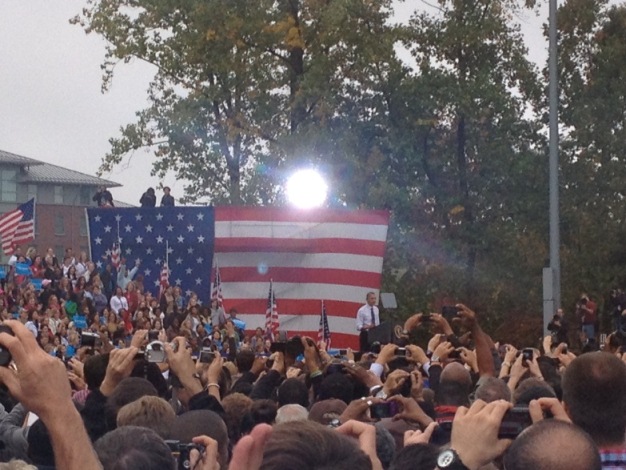I was recently fortunate enough to watch President Obama give a speech to the Democrat faithful in Virginia. Against an all-American background of a Stars and Stripes on the football field at George Mason University, the President rallied the troops with attacks on his Republican counterpart and by setting out his vision for a second term in office.
Wary no doubt of recent polls indicating Republican gains amongst women voters, the recurring themes of the speech included a woman’s right to choose and equal pay for equal work. Following an introduction from Cecile Richards, President of Planned Parenthood, the President gleefully reminded his supporters that the first piece of legislation he signed when he came to office was the Lily Leadbetter Act, which made it easier for women to bring lawsuits against their employers on the grounds of pay discrimination.
However, the abiding memory for those who attended the rally is the birth of the phrase ‘Romnesia’, used by Obama to describe his opponent’s alleged inconsistencies. After listing these inconsistencies, the President delivered his punch line – “Here’s the good news – Obamacare covers pre-existing conditions”.
The complete media saturation of this election renders sound bites like this invaluable. The public are suffering from electoral fatigue. “…the campaign has played itself out”, wrote Gary Younge in The Guardian. Political advertisements flood the air waves. As well as election adverts, those in the Washington area are constantly bombarded with messages about Question 7, a referendum held alongside the election on whether to add a sixth casino to the five already authorised in Maryland. Most of those on the receiving end are not even eligible to vote on the issue, as it is open to Maryland residents only.
Memorable sound bites characterise the media coverage of any speech or debate. Take the final presidential debate as an example. “If you are looking for moments – and remember that the media coverage over the next few days will focus on just that – Obama had two”, wrote Chris Cillizza in The Washington Post. Much of the post-match analysis of the debate focussed on Obama’s sarcastic comment that the US army has less bayonets and horses than it did in 1917, a barb delivered in response to Romney’s complaint that the US navy is smaller than it has been at any time since that year. Almost immediately, social media and the internet were awash with in depth analysis of this statement. Gossip website TMZ “…spoke with multiple people in the bayonet industry who tell us (TMZ) they were shocked and even offended when Obama brought up the weapon during last night’s debate.”
The risk with all of this is that it cheapens the debate, and political discussion is lost as both sides are reduced to trivial discourse and petty squabbling. President Obama perhaps has more to lose in this respect. Right wing talk radio hosts are dismissive of his quips, complaining that they are puerile and belie an inability to engage with Romney on a serious level. As leader of the free world, there are many who would expect him to maintain a degree of dignity and separation that befits the position. But in an election race that is being contested in stadiums, TV studios and across social media, memorable sound bites spread, and less exciting material is buried.






